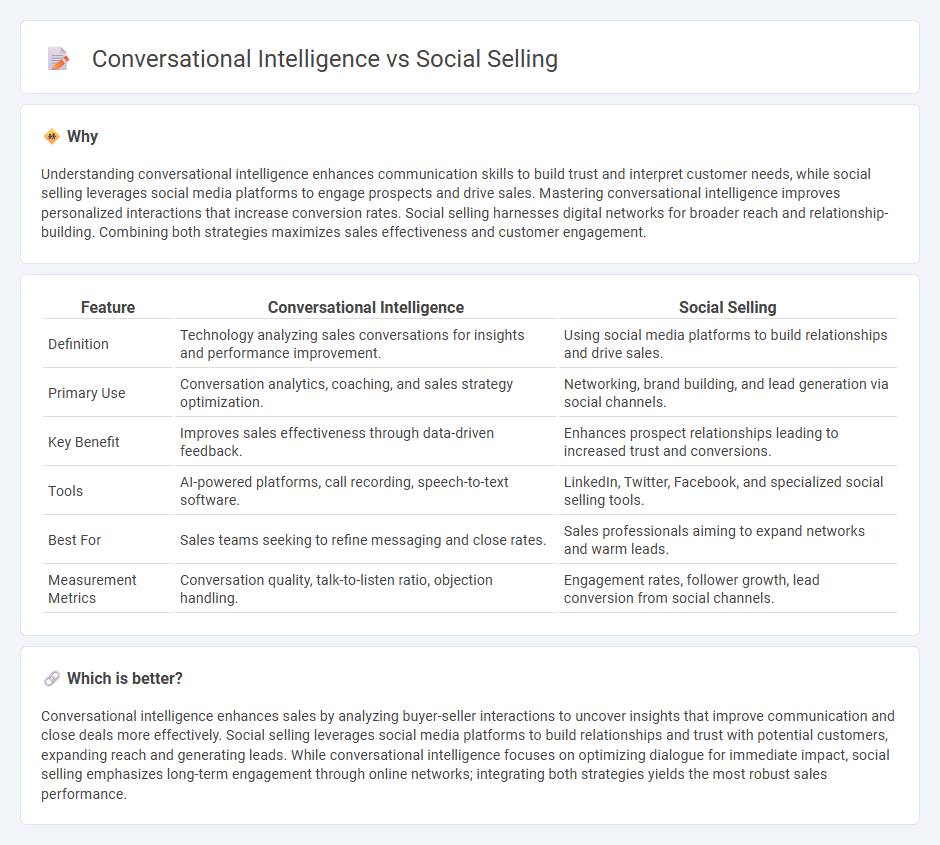
Conversational intelligence leverages AI to analyze sales interactions, uncovering insights that enhance communication strategies and customer engagement. Social selling utilizes social media platforms to build relationships, nurture leads, and drive sales through authentic connections and targeted content. Explore the strengths of both approaches to boost your sales effectiveness and customer rapport.
Why it is important
Understanding conversational intelligence enhances communication skills to build trust and interpret customer needs, while social selling leverages social media platforms to engage prospects and drive sales. Mastering conversational intelligence improves personalized interactions that increase conversion rates. Social selling harnesses digital networks for broader reach and relationship-building. Combining both strategies maximizes sales effectiveness and customer engagement.
Comparison Table
| Feature | Conversational Intelligence | Social Selling |
|---|---|---|
| Definition | Technology analyzing sales conversations for insights and performance improvement. | Using social media platforms to build relationships and drive sales. |
| Primary Use | Conversation analytics, coaching, and sales strategy optimization. | Networking, brand building, and lead generation via social channels. |
| Key Benefit | Improves sales effectiveness through data-driven feedback. | Enhances prospect relationships leading to increased trust and conversions. |
| Tools | AI-powered platforms, call recording, speech-to-text software. | LinkedIn, Twitter, Facebook, and specialized social selling tools. |
| Best For | Sales teams seeking to refine messaging and close rates. | Sales professionals aiming to expand networks and warm leads. |
| Measurement Metrics | Conversation quality, talk-to-listen ratio, objection handling. | Engagement rates, follower growth, lead conversion from social channels. |
Which is better?
Conversational intelligence enhances sales by analyzing buyer-seller interactions to uncover insights that improve communication and close deals more effectively. Social selling leverages social media platforms to build relationships and trust with potential customers, expanding reach and generating leads. While conversational intelligence focuses on optimizing dialogue for immediate impact, social selling emphasizes long-term engagement through online networks; integrating both strategies yields the most robust sales performance.
Connection
Conversational intelligence enhances social selling by enabling sales professionals to better understand and respond to customer conversations, leading to more personalized and effective interactions. By analyzing dialogue patterns and customer sentiments, conversational intelligence tools help identify buying signals and build trust throughout the sales process. Integrating these technologies increases engagement rates and accelerates deal closures in social selling environments.
Key Terms
**Social Selling:**
Social selling leverages social media platforms to build relationships, engage prospects, and drive sales by sharing relevant content and personalized interactions. It focuses on understanding customer needs, tracking social engagement metrics, and nurturing leads through trust and credibility. Explore how mastering social selling strategies can transform your sales pipeline and improve customer retention.
Personal Branding
Social selling leverages a strong personal brand to build trust and engage prospects through authentic content and meaningful online interactions. Conversational intelligence enhances these interactions by analyzing communication patterns and emotional cues, enabling tailored responses that deepen connections. Explore how integrating personal branding with conversational intelligence can transform your sales strategy.
Social Listening
Social selling leverages social listening to identify customer needs, monitor brand sentiment, and engage prospects through relevant content on platforms like LinkedIn and Twitter. Conversational intelligence enhances social selling by analyzing interactions to understand customer intent, optimize communication strategies, and improve relationship-building techniques. Discover how integrating social listening with conversational intelligence can boost your sales effectiveness.
Source and External Links
Social selling - Wikipedia - Social selling is the process of developing relationships as part of the sales process, primarily via social networks like LinkedIn and Twitter, focusing on one-on-one interactions rather than broad marketing campaigns.
What Is Social Selling? (With Benefits and Best Practices) - Indeed - Social selling uses professional social media profiles to build relationships and secure leads by sharing strategic content and gaining credibility, helping both B2B and B2C marketers achieve sales goals.
The Social Selling Sales Playbook -- Data-Backed Tips You Need ... - HubSpot - Social selling is a strategic approach to connect, engage, and build authentic relationships on social platforms like LinkedIn and TikTok, generating high-quality leads through consistent, personalized interaction rather than cold outreach.
 dowidth.com
dowidth.com